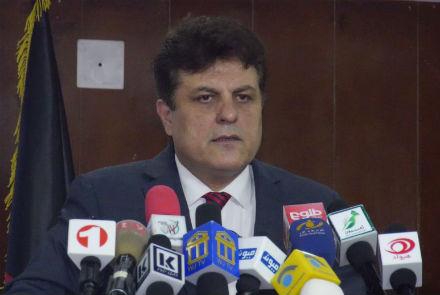Abdul Latif Pedram, the leader of the National Congress Party (NCP) on Saturday said his party officially recognizes the Durand Line between Afghanistan and Pakistan as an official border and that most of the tension between the two countries is rooted in Kabul’s failure to publicly acknowledge this.
According to Pedram, government does quietly accept the Durand Line as the border but is not honest in its recognition with the public.
“Why does government not complain to the United Nations? Government should refer (the issue) to the United Nations and say it is our right and give it to us; why does government not do this? (Government) only tell lies and always says Durand, Durand, Durand ... government should discuss it logically,” Pedram said.
The National Congress Party believes that documents signed between Afghan kings and British-India officials in 1893 and again in 1903 clearly state all issues relating to the Durand Line.
The border dispute dates back to the nineteenth century, when Pakistan was part of India and India was a British colony.
In a bid to strengthen their control over the northern parts of India, the British imposed the 2,640km borderline on the Amir of Afghanistan in 1893.
The agreement was signed between Sir Mortimer Durand, the Indian Foreign Secretary at the time, and Amir Abdur Rahman Khan in Kabul. As such the line is known as the Durand Line.
Abdur Rahman Khan’s successor, Amir Habibullah Khan, in 1905 signed a new agreement with Britain confirming the Durand Line.
After the founding of Pakistan in 1947, Afghanistan demanded that Pashtuns living on the Pakistani side of the Durand Line be given the right to self-determination but Britain and Pakistan refused.
In response, the Afghan government reportedly refused to acknowledge the Durand Line as an official border and tension between the two neighbors grew.
“Some people says that the Durand Line (agreement) was imposed on Afghanistan, while imposed agreements are those that are signed by the defeated countries after war. You know that Afghanistan was not defeated in the war,” said Ghulam Mohammad Mohammadi, a historian.
A number of Parliament Members (MPs) meanwhile said the issue of the Durand Line should be referred to the Afghan people and that people should decide whether to hold a Loya Jirga.
“Unless a Loya Jirga is held and all Afghan people are included, individual talk is not important and is not a matter of concern,” said Mohammad Nazir Ahmadzai, parliament’s second deputy speaker.
The Afghan government however says that documents signed at the time are invalid. The acting minister of borders and tribal affairs said the people living in both sides of the Durand Line should decide.
“The people living on this side (of the line) cannot decide about it alone. I once again stress that it should be discussed with the people. People jointly should decide about it, the Afghan people, including the millions of people who have been separated from the country,” said Abdul Ghafoor Liwal, acting minister of border and tribal affairs.
This comes after a recent spate of incidents relating to the Durand Line. In February, Pakistan closed the crossings for a month. They also conducted missile attacks on bordering areas of Afghanistan and last week started building a fence along the line.

